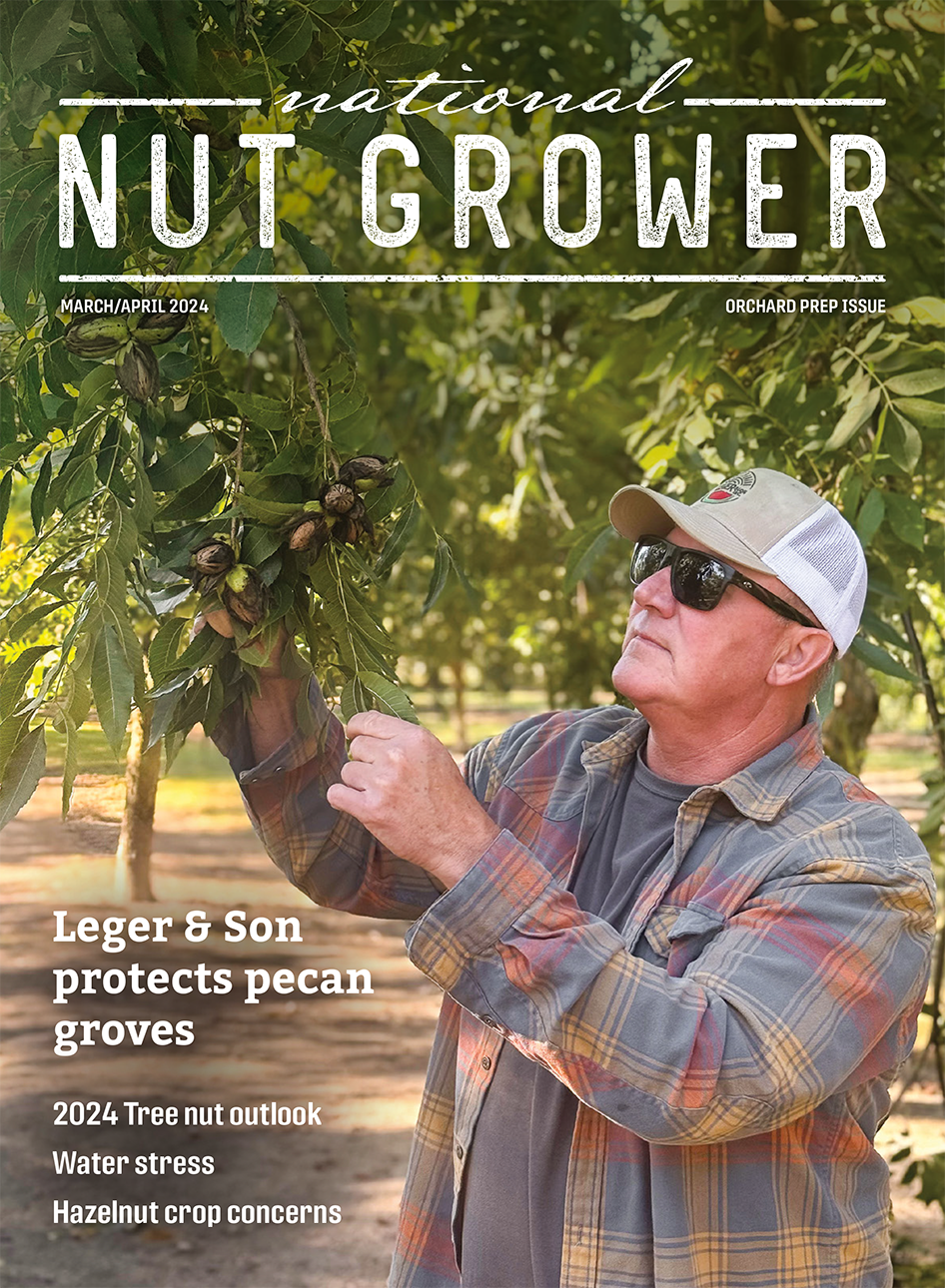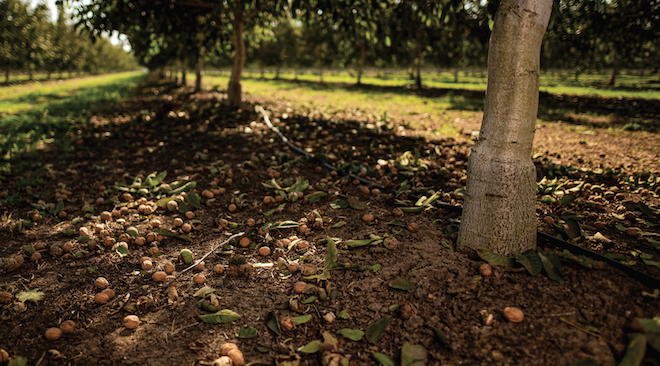
Winter 2021
Almond grower the first to earn sustainability certification
Bullseye Farms is a 16,000- to 18,000-acre conventional farming operation finding a balance in sustainability. With general practices on the farm meeting a lot of criteria fitting under a sustainable model, the Woodland, California-based farm sought certification for its roughly 4,000 acres of almonds.
Bullseye became involved with major third-party, international sustainability certifier SCS Global Services, which promotes sustainability through a number of programs. However, there was not yet a program for almonds.
“We had already implemented practices we thought fit into the sustainability program, such as cover cropping, composting, and our IPM (integrated pest management) program,” said Nick Edsall, director of orchard operations at Bullseye Farms. “And a lot of our practices also fit the sustainability – the overall health and economics – of the business as well.”
As the process moved forward, SCS Global conducted a three-day farm audit, combing through and verifying records, as well as thoroughly inquiring about Bullseye’s IPM program and labor practices. Employees were interviewed in the field and asked about labor management and Bullseye as an employer, which has less than a 1% average turnover rate for employees. After the audit, SCS Global came back with some suggestions, mostly regarding record keeping and pest control.
“We had an agreement of what we would change to be considered sustainable by their program,” Edsall said.
Last year, Bullseye Farms became the first almond grower to be independently certified under the internationally recognized “Sustainably Grown” standard for agricultural crops, joining the ranks of other tree nut industry leaders, such as Crain Walnut in California and Ferrero Chocolate, maker of Nutella, with its hazelnut orchards in Serbia and Chile.
The Sustainably Grown certification standard applies to products meeting the highest levels of environmental, social and economic sustainability, said a news release, and the program has been benchmarked to numerous international schemes for ethical and sustainable performance.
“We do a lot of things growers just don’t do, especially growers of our size,” said Kristin Jacobs, sustainability manager at Bullseye. “This audit went far beyond just checking boxes and getting certified. Our practices put us already about 70% there, so we just decided to go for it.”
It took 6-8 more months to meet the certification requirements, and SCS Global returns every year to audit the farm as part of continued certification.

From harvest to bloom and back again, the crew at Bullseye Farms cares for the land with sustainability in mind. Not only for the almond, walnut and pistachio orchards, but for all the other crops as well. Photos: BULLSEYE FARMS
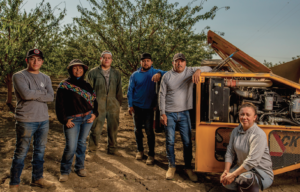
Fine-tuning farm practices
Achieving such recognition didn’t come without some changes to the usual processes. SCS Global has a list of different chemicals that it discourages from use due to the chemicals’ associations with negative health or environmental impacts. And while certain chemicals may be on that list, Edsall said, it doesn’t necessarily mean those chemicals can’t be used. “You have to have a justification as to why you’re using them, if there are other alternatives that you can use, and show that you have a program for safety to mitigate any potential problems that those chemicals might cause,” said Edsall.
For example, some materials may pose risks for runoff, which would require a dry forecast for the following few days before being able to apply a spray treatment.
“Pest and disease pressure is always a challenge,” said Kevin Warner, sustainable agriculture business development manager as SCS Global Services. “Consumers are often vocal in their objections to synthetic pesticide use, but organic certification at scale is not always attainable. ‘Sustainably Grown’ offers a happy compromise of reduced pesticide use while understanding the practicalities of commercial production.”
One such chemical is abamectin. While the tree nut and sustainability industries don’t generally like this chemical, it’s a fairly inexpensive option for mite control. It is, however, harsh on the predatory insects that feed on the mites, as well other beneficial insects.
Effective as it might be, this is one for which Bullseye uses an alternative whenever possible. The alternative options tend to cost more, but they don’t negatively impact the beneficial insects, which means less chance of a population explosion later in the season of the mites the farm is trying to control.
For fields ditching the majority of harsh chemicals in the name of sustainability, this can sometimes make pest management a bigger hurdle to clear. Promoting a more natural system and encouraging environmental health means fewer and fewer chemicals are available, making attention to alternatives a top priority. Since Bullseye sees this concept continuing, the farm maintains practices with this in mind, especially in the case of addressing navel orangeworm pressure.
The first line of defense is a very strong sanitation program, which helps reduce hull split spraying as much as possible. After harvest, the shakers are run through the orchards again to remove any mummies, and the trees are again surveyed to determine whether or not they should be shaken again when conditions are better, such as after a rain, when the mummies fall more easily. As a last resort, a poling crew is sent into the field to remove any remaining mummy nuts.
As for monitoring pest pressure, “We use a trap out system,” said Edsall, “and it’s just one example of how we’re moving further away from spraying.”
Bullseye Farms uses independent pest control advisors (PCAs), with Edsall noting that his advisors look more thoroughly at alternatives since there’s no incentive to recommend chemicals. PCAs do mummy counts – calculating how many are left in the tree, and how many worms are in the nuts – to make a population estimate of how many will hatch in the spring. Mass traps are placed in the field to trap mated females, so that when the eggs are laid, they are caught in the traps and not in the nuts.
Aside from taking care of the orchards, Bullseye is also trying to be a mindful neighbor. With so many of its orchards surrounded by homes and roads, it’s even more important to move away from chemicals and reduce dust.
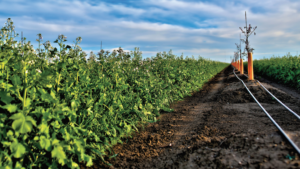
Eye on tech
Aside from alternatives to sprays and other areas of improvement, Bullseye Farms is always on the lookout for new technology to support its operation.
“It’s funny because a lot of sustainability, it seems, are methods that are older technology, like cover cropping and composting, which have been around for thousands of years,” said Edsall. “But there’s also new tech.”
Edsall has been working with agtech companies with tools that measure tree stress directly from the tree instead of the soil water content. “Just because there’s moisture in the soil, it doesn’t mean the tree is using it efficiently,” said Edsall.
While the farm still uses pressure chambers and many employees are trained to test tree stress during the summer, this is a very labor- and time-intensive practice. Bullseye’s adoption of dendrometers has been successful, with the number of sensors in the field increasing as the team becomes more familiar with them.
“Sensors are huge to us in terms of labor savings and being more efficient with our water,” said Edsall.
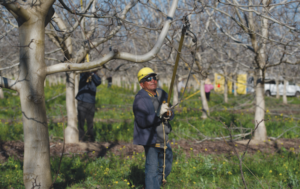
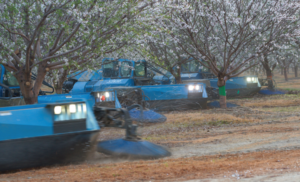
Exploring retail
Around the time Bullseye Farms began pursuing the Sustainably Grown certification, it had another endeavor in the works – the new Almond Lane brand. Only the highest quality Bullseye-grown almonds were packaged and for sale straight from Bullseye. Available through the company website and Amazon, Almond Lane also made it onto local Raley’s and Bel-Air grocery store shelves through the city of Woodland’s The Food Front organization. Consumers have been so pleased that they’ve begun requesting specialty, seasoned flavors from Almond Lane. With the savory, vegetable-based snack market expanding last year to $4.2 billion, and the trend focusing on healthy snacks, it’s a promising market for Almond Lane and the impressive nutrient profile that almonds offer.
To accompany Almond Lane, last summer Bullseye Farms launched The Farm Stand to sell its products. It opened to success and fanfare, making it one of the very few farm-to-consumer almond companies. The Farm Stand also sells goods from local growers, such as a variety of tomatoes, squash, rice, beans, melons, local honey and more, and oftentimes produce not found in grocery stores.
“It’s just a really great opportunity for consumers to learn exactly how much growers really can do in terms of environmental, social and economic resiliency,” Jacobs said.
Photos courtesy of Bullseye Farms.







